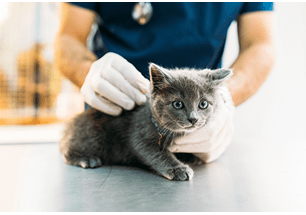
Now that your kitten is around 3 months old, your veterinarian will be recommending the feline leukemia (FeLV) vaccine.
Feline leukemia virus is spread between cats via bodily fluids, such as through cats grooming each other or biting one another. The virus depresses a cat’s immune system and can lead to anemia and cancers. FeLV often leads to lifelong infection and can be fatal.
Vaccination is recommended for all kittens under 1 year of age because FeLV can be so dangerous for cats, and younger cats are more susceptible to FeLV infection.
Typically, a blood test for FeLV and another cat virus called feline immunodeficiency virus (FIV) is performed prior to vaccination. This is because the FeLV vaccine offers no benefit to cats who are already positive for FeLV.
To create a strong immune response, two doses of the FeLV vaccine are administered one month apart. So, if your kitten receives a FeLV vaccine at their 3-month appointment, they’ll need a booster the next month. Missing the booster may mean you need to restart the vaccine series.
When your kitten becomes an adult, FeLV is recommended on an as-needed basis. If your cat will be spending any time outdoors, an annual FeLV vaccine is highly recommended.
Make sure to discuss your cat’s individual FeLV risk with your VCA care team. Your veterinarian is your best resource for FeLV vaccine recommendations.
A CareClub® membership for your kitten includes their annual exams, rechecks and sick appointments¹ along with the vaccines and yearly preventive services² your pet needs to support their best health.
CareClub Memberships are preventive pet health care plans and not pet insurance. CareClub Membership covers only the selected health care services and products which are specifically identified in the applicable CareClub Membership agreement.
- Unlimited exams are exams during regular business hours, excluding specialty, urgent care or telemedicine exams, subject to promotional offers.
- Vaccines may include rabies, feline distemper (Panleukopenia), feline respiratory virus (Rhino, Calici) and feline leukemia (FeLV). Lab work checks for issues like diabetes, liver and kidney disease, parasites and general infections.





